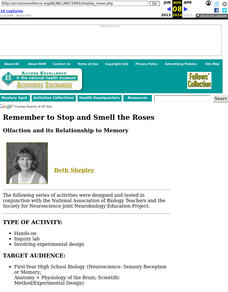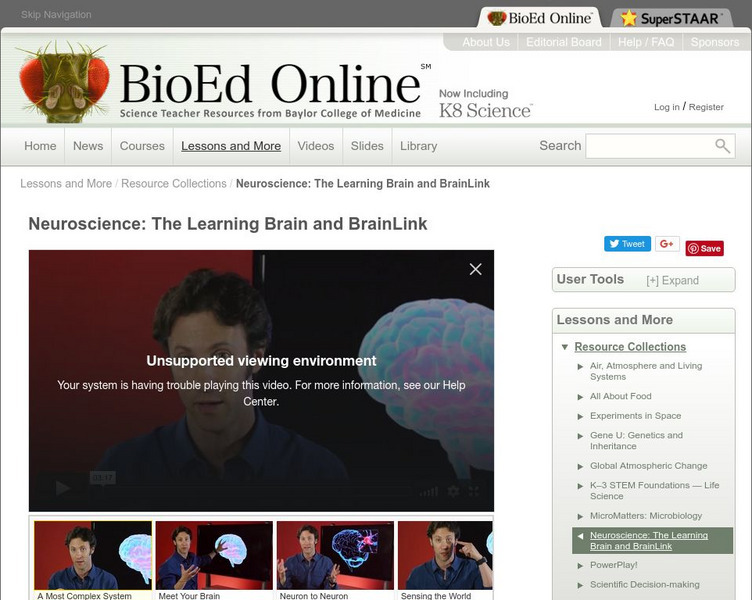Curated OER
Remember to Stop and Smell the Roses: Olfaction and its Relationship to Memory
Young scholars discover that olfaction elicits memory associations. They investigate how olfaction compares to other sensory modalities in the formation of memories. This is a hands-on lab activity guaranteed to build memories in your...
Curated OER
Word Connections
Students explore the science of word associations. They take a memory quiz, read articles on how the brain processes language, explore the concept of false memories and create and illustrate their own original word associations.
Curated OER
The Brain’s Inner Workings
Do you want to learn about how you learn? Help pupils become the best learners they can be by teaching them how their brain works. The resources available include videos about brain structure and a study guide full of activities that...
Curated OER
Brain and Senses
Students investigate the brain through multiple senses. In this biology lesson, students experiment with different activities involving taste, memory, touch, and sight to understand how the brain works. Students work in partners and...
Curated OER
Brain Concentration
Students play a card game to test their memory. Special cards are provided, as well as clear directions.
Curated OER
The Nervous System from A to Z
In this nervous system alphabet book worksheet, students study 26 neuroscience terms as they read the 26 terms and their definitions in the glossary. Some of the terms included are: receptor, unipolar, white matter, axon, hemisphere,...
University of Minnesota
Mirroring Emotions
Do you ever give your class the "teacher look"? Without saying a word, they become silent and engaged (hopefully). How do they know what you're thinking? Explore the concept of nonverbal communication and how it relates to our...
Open Colleges
Your Brain Map: Strategies for Accelerated Learning
The brain is a complex organ with many different structures and functions. An interactive diagram allows learners to explore the different structures while pop-ups describe their functions. Secondary interactives show the structures of...
University of Minnesota
Virtual Neurons
It's electric! Young anatomists use Virtual Neurons software to build, control, and analyze complex nerve circuits within the body. Colorful and packed with content, class members enjoy interacting with the nervous system...
American Psychological Association
Using Psychological Perspectives to Answer Questions on Behavior
Perspective is everything when it comes to assessing human behavior. Class members examine a series of statements and identify the perspective represented by each to demonstrate their understanding of different psychological perspectives.
Curated OER
Brain Power
In this science worksheet, students investigate the anatomy and function of the human brain. Students read facts about the parts of the brain and what each does. Students compare the size of the human brain to that of other animals....
Curated OER
The Musical Mind
Students go on a tour of how and why music styles have changed over the years, and discover where they can gather some insight about their favorite musical styles and artists. There are excellent websites imbedded in this lesson plan.
BioEd Online
Bio Ed Online: The Learning Brain: Neuroscience
This series of videos introduces students to the brain, including why it is so special, its parts and functions and how it recalls memories and stores new information. Other videos explain how the brain processes sensory information and...
Massachusetts Institute of Technology
Mit: Open Course Ware: Courses: Brain Cognitive Science: Cognitive Neuroscience
College-level online neuroscience course focusing on human memories. Course highlights how memories are created and controlled, and how we are able to remember the past. Course features include readings and related resources on the topic.
Other
Society for Neuroscience: Brain Facts [Pdf]
This is a publication on the human brain and how it works. Gives details on the neuron, how the senses interact with the brain and much more. PDF (requires Adobe Reader).
University of Washington
Neuroscience for Kids: Brain Games
Engaging site for K-12 students to learn more about how the brain functions-- and have some fun at the same time.
University of Washington
Neuroscience for Kids: Brain Games
Engaging site for K-12 students to learn more about how the brain functions-- and have some fun at the same time.
University of Washington
Neuroscience Resources for Kids: Ecstasy Mdma
Here, students can read about the dangers associated with the designer drug called ecstasy. Learn about the short-term and long-term effects associated with this dangerous drug. Included is information on proper brain function, as well...
















![Society for Neuroscience: Brain Facts [Pdf] Activity Society for Neuroscience: Brain Facts [Pdf] Activity](https://content.lessonplanet.com/knovation/original/113866-cd2169bec6c0105fc678c671521bd642.jpg?1661266885)


